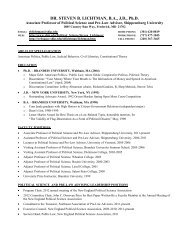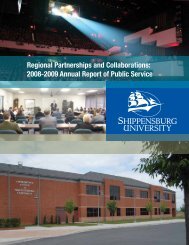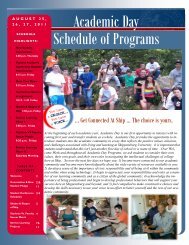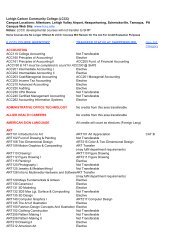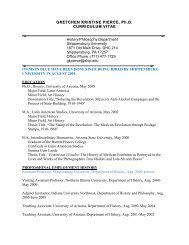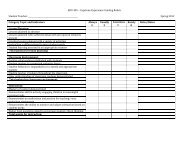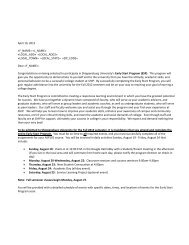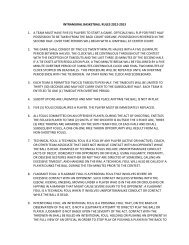Complete Issue - Shippensburg University
Complete Issue - Shippensburg University
Complete Issue - Shippensburg University
- No tags were found...
You also want an ePaper? Increase the reach of your titles
YUMPU automatically turns print PDFs into web optimized ePapers that Google loves.
62 PROTEUS: A Journal of Ideasany given society cannot take place without sources ofwater. This economic development of providing watersupply infrastructure creates positive changes in cultureand politics, thus fulfilling the definition of a virtuousexpanding cycle (Porter 1990).Exploitation is possible in super-poor countries ingeographic areas such as Africa, where exploitationof resources and faulty policies may stifle benefits andthe vicious cycle of decline continues. Attempts mustbe made at providing suitable water supplies, becausecurrent water situations permanently hinder anydevelopment.Chinese environment. The circumstances providingfor global virtuous expanding cycles or vicious cyclesof decline exist with the Chinese market. Economicdevelopment begets economic development; there existsa virtuous expanding cycle in China, that supporters ofcapitalism claim provides benefits across and array ofpolitical and social issues. Hopefully, as their economicsystem expands through the benefits of water systeminfrastructure, positive advantages will occur in Chinawithin the human rights area. Concern continues overthe intent of the central government in its policiestoward personal liberties.Benefits in trade processes contribute, in anamplified way, towards a benefit of human civilization.This virtuous expanded cycle presents itself in theglobal trade of water system suppliers. The opposite,embodied by the vicious cycle of decline presents itselfwhen policies and applications of trade are convolutedfor illicit means. For the most part, both globally andin China, water system development presents thevirtuous expanding cycle. This important identificationrepresents part of the strategic plan for Veolia as itcontinues its course in globalized trade, reachingtransnational status.Competitive Impact on Veolia EnvironmentOrganizations require strategic planning forsuccessful foreign operations. Multiple attributesapply including cultural aspects of the firm, foreignenvironment, political ramifications of trans-globaltrade, and international trade relationships. Veoliamust ensure its business process paradigms addressmultiple international characteristics with a systemicorientation. While trading in China, for example,Veolia must reasonably assure its stakeholders thateffective corporate management enables globallyconsistent business processes. Factors potentiallyderailing Veolia and its competitive advantage requirediscernment and reconciliation for smooth operations.Potential factors causing problematic circumstancesinclude government upheavals, anti-water privatizationconcerns, and the inability to anticipate and implementmarket place changes. As market growth includesfactors new to Veolia management, an adequateframework established in strategic planning requiresimplementation. This framework must include goalseeking scenarios for profit maximization and marketpenetration; reorientation of business processes;organizational metrics accessing foreign operations; andcontrol mechanisms that alter unsuccessful programs.Various paradigms, such as Porter’s five forces anddiamond models present tools for assessing andmanaging foreign operations. Generating considerationfor multiple attributes of the company related totransnational operations becomes part of the missionand vision of the firm.Veolia must define its perception for sustainablegrowth in global situations, particularly its Chineseoperations. Determining the attributes that governappropriate courses of action in differing circumstancesis a priority. Although predicting future events mayprove futile in large part, discerning future economicpatterns represents a prerequisite for long-termstrategic planning. A model consisting of paradigmsfor at least a ten-year time frame must be included inorganization policy. A combination of sensing marketplace evolutionary iterations based upon experience willenable Veolia continued leadership in its industry.Veolia’s background consists of a strong nationaladvantage for its industry. This national advantagetranslates to economic advantages in foreignmarketplaces. Veolia must foster this national advantagethrough its own operations in conjunction with thehome country. Similarly, multiple home countryadvantages require development as each foreignoperation contains the potential for a future homecountry, adding to its competitive strengths.As a multinational enterprise, Veolia muststrategically plan a “national diamond” (Dunning1993) that creates a competitive advantage for theorganization in the countries it operates. This isparticularly true for its Chinese operations as thereduced transaction costs favoring Veolia may beexplored for diversion to potential investment reapingadditional profits. This presence in Asia serves as theorigination for future ventures in this geographic locale.Business change occurs constantly. Veolia must seekout, through market signals, the potential for changeand innovation. The decision making of the firmrequires a composition that embraces change initiatives.By sensing and embracing the possibilities for change,Veolia presents a continual leadership role in the globalindustry.Veolia faces multiple considerations in managingits global operations, and in particular its Chineseoperations. Differing strategic plans encompassingvariations in its enterprises impart models that assessthe competitive environment and allow the firm toplan accommodating scenarios for successful ventures.Veolia’s embrace of substantive models that permit andencourage change consist of positions for policy andprocedure development consistent with sustainable



